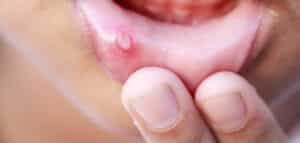Aphthae are small lesions in the mouth that can cause great pain. There are many reasons for their appearance, from inadequate oral hygiene to a side effect of stress or allergies. Sometimes they disappear on their own, sometimes they require treatment. Find out what exactly a mouth ulcer is, where it comes from and how to treat it in our article.

Afta - what is it?
Afts are small (up to a maximum of 3 cm in diameter) cavities of the mucous membrane in the mouth. They most often take the form of erosions or ulcerations that become covered with a white, yellow or grey plaque after 1-2 days.
Aphthae most often appear on the palate, cheeks, lips or tongue. They are more common in women than in men and in adults than in children.
Importantly - aphthous are not contagious, unlike herpes, which is the result of a viral infection.

What do aphthae originate from?
There are many causes of afts. The most common is inadequate oral hygiene, but also the use of dirty cutlery, eating unwashed fruit and vegetables as well as nail biting or biting the tip of a pen.
Other causes of afts include.
- Tooth diseases such as pulpitis, caries
- Eight-branch eruption
- Mechanical damage, e.g. when brushing teeth
- Incorrectly fitted prosthesis or braces
- Aallergies and stress, which not only affects the appearance of afts. For more on this topic, see our article -. Stress affects your teeth! Learn simple habits that will improve your day and your smile
Importantly, the above factors are the cause of so-called small aftswhich are the most common. In addition to these, there can be so-called large aphthae, which can be up to 3 cm in diameter. They most often appear in the throat area or on the palate causing much more pain, weakness and even enlargement of the lymph nodes.
Large aphthae are an ailment that affects around 10% of the population. They are caused by the already mentioned poor oral hygiene, but also by hormonal and autoimmune changes, vitamin and mineral deficiencies.

How to treat them?
First of all, prevention is the best. That is why it is worth taking care of proper oral hygiene, brushing teeth regularly, flossing and visiting a dentist's office at least every 6 months. Professional hygiene will not only reduce the risk of the appearance of aphthous ulcers, but also protect against periodontitis, which may end in tooth loss.
You can read more about this in our article - Modern periodontitis treatment in the UK with Vector Paro Pro.
We also have good news - in most cases aphthae heal spontaneously, on average after 4 weeks ulcers should subside. During this time, it is advisable to strictly observe oral hygiene and minimise the risk of mechanical damage. If the aphtha does not disappear, it is important to see your dentist, who will prescribe remedies to speed up healing and reduce pain. These will be gels, liquids or sprays - depending on the location of the aphtha.
A doctor should also be contacted if aphthae occur more than twice a year.

Home remedies for aphthous ulcers
If you want to accelerate the healing of afts, remember to avoid hot drinks, alcohol, but also chocolate, citrus fruit and spicy food. In short, anything that can irritate the oral mucosa.
In addition, remember to take vitamins, mainly B vitamins and zinc.
If you are struggling with aphthae you can buy a preparation from a pharmacy or try one of the home remedies for aphthae. To do this:
- You can brew the tea and, once it has cooled down, apply the pouch to the area of mucosal irritation. The theine relieves the pain.
- It is also a good idea to make rinses of chamomile, sage or burdock 2-3 times a day
- You can also disinfect the wound with hydrogen peroxide, for which it is best to put a small amount on a cotton bud and apply it directly to the aphtha.
IMPORTANT: If aphthas persist or recur, contact your doctor.

